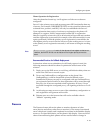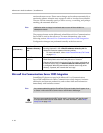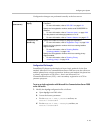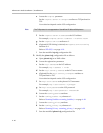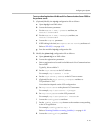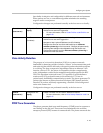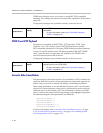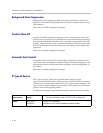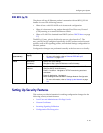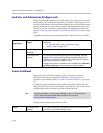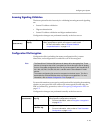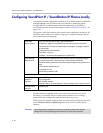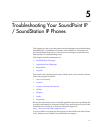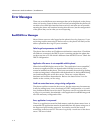
Configuring Your System
4 - 45
For the SoundPoint IP 501 and 601, utilizing acoustic echo cancellation will
introduce a small delay increase into the audio path which might cause a lower
voice quality.
Audio Codecs
The following table summarizes the phone’s audio codec support:
Configuration changes can performed centrally at the boot server or locally:
Note
AEC on the SoundPoint IP 301 handset is not supported.
Algorithm MIME Type Ref. Bit Rate
Sample
Rate Frame Size
Effective
audio
bandwidth
G.711μ-law PMCU RFC 1890 64 Kbps 8 Ksps 10ms - 80ms 3.5KHz
G.711a-law PCMA RFC 1890 64 Kbps 8 Ksps 10ms - 80ms 3.5KHz
G.722 G722/8000 RFC 1890 64 Kbps 16 Ksps 10ms - 80ms 7 KHz
G.722.1 G722/16000 RFC 3047 16 Kbps,
24 Kbps,
32 Kbps
16 Ksps 20ms - 80ms 7 KHz
G.729AB G729 RFC 1890 8 Kbps 8 Ksps 10ms - 80ms 3.5KHz
SID CN RFC 3389 N/A N/A N/A N/A
RFC 2833 phone-event RFC 2833 N/A N/A N/A N/A
Central
(boot server)
Configuration file:
sip.cfg
Specify codec priority, preferred payload sizes, and jitter buffer tuning
parameters.
• For more information, refer to Codec Preferences <codecPref/>
on page A-35 and Codec Profiles <audioProfile/> on page A-36.
Local Web Server
(if enabled)
Specify codec priority, preferred payload sizes, and jitter buffer tuning
parameters.
Navigate to http://<phoneIPAddress>/coreConf.htm#au
Changes are saved to local flash and backed up to <Ethernet
address>-phone.cfg on the boot server. Changes will permanently
override global settings unless deleted through the Reset Local
Config menu selection and the <Ethernet address>-phone.cfg is
removed from the boot server.



